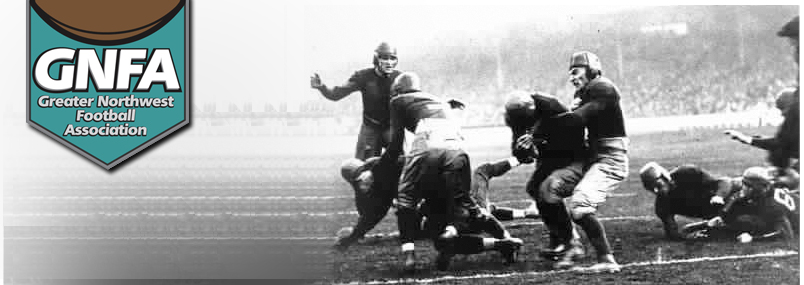|
One of the biggest short comings in semi-pro
football is when teams do not or do not know
how, to keep accurate stats for the players.
ALL GAMES COUNT! The GNFA
counts all games in a season, not just
"league affiliated" games. Do not
short change your players by not taking
stats for "preseason" games, post-season
games, championships, bowl games, or
other non-league games. Some
players in past leagues were only
credited with their 8 regular season
league games, while as a team, they
actually played 12-16 games in a season.
Imagine only getting credit for HALF a
season! A coach wouldn't accept
being credited with only 8 games, a
player shouldn't either.
Our intention here is to provide a
simple real-time stat format that anyone can
use on game day and not completely rely on
video to compile stats.
What is
needed:
1 - volunteer, staff member
or injured player
2 - Paper and Pencil
3
- Basic knowledge of football
The
program I used was created off of the NCAA
Statisticians Manaul available for download
to the right of this page. It is
updated every year with new interpretations
as rules change. The NCAA and NFL are
very similar in stats keeping with the
exception of sack yardage being subtracted
from rushing or passing totals. The
rest is very basic, and at the semi pro
level, it is all very simple to comprehend
for the most part.
Example 1:
Play by Play & Statistics: April 16th,
2005 Commandos @ Shockers; Oakville, WA
Kickoff 3:00 PM PST
|
Shocker Possessions |
Commando Possessions |
|
Kickoff:
Shocker #0 to Commando 2 yd
line |
Return 13 yds by #82 tackle: (#19) |
|
(#40) |
1-10 C15
R 1 (32) |
|
(98/41) |
2-9 C16
R 0 (32) |
|
32 PBU |
3-9 C16 P INC (12) |
| |
4-9 C16
Punt 22yds (86)
(bad snap) |
|
1-10 C38
R 12
(#34) Penalty Facemask +5 yds |
|
|
1-10 C21
R 21 (34)
Touchdown |
|
|
Xpt no good (0)
|
((Score
6-0)) |
| |
|
| |
|
In the above
example, player jerseys are used for
quick notation. Names are not
necessary.
Interpretations: Shocker #0 kicked
off to Commando #82, returned for 13
yards, tackled by #19, 1st and Ten
Commandos at their own 15.
Run by #32 for one
yard tackled by #40, Run by #32 for no
gain, tackled by #98 and 41 (half tackle
each). Third down pass by #12
incomplete, pass broken up by #32.
Fourth down punt for 22 yards by #86, no
return. Special coaches note:
bad snap cause of bad punt.
Shockers ball on the Commando 38.
1st Down run by #34 for 12 yards. (could
not see who tackled). Incidental
facemask added to the run. Ist and
ten at the Commando 21. Run by #34
for 21-yards Touchdown. PAT by #0
was no good. Score: Shockers 6
Commandos 0.
NOTE: Always use a designation
to note which side of the 50-yard line
you are on. Here I used "C" when
on the Commandos side of the field and
"S" when on Shockers side.
Make sense?
If it doesn't, create a short-hand
system that works for YOU. The
goal of taking stats in real time versus
relying on film is that editing or video
interruptions can cause you to miss why
down and distance are not where you
would expect them to be. In real
time, you have the EXACT down and
distance at the snap of the ball.
If film has been edited, it may have
missed a penalty assesment, which is why
your down and distance doesn't match.
During time outs, notes can be added for
coaches. What if your team doesn't
have anyone to video the game? One
person, and a pencil and paper can get
the job done for your players.
There is no excuse to not take stats if
you are running a quality organization.
The ease of this system also allows you
to track your opponents rushing and
passing information in real time aa
well. You may not be able to get
their defensive stats perfect, but for
the main statistical categories, sacks,
INT, fumble recovery, etc...those are
easily captured. Tackle stats are
very inconsistent from team to team
across the semi pro realm which is why
the GNFA doesn't keep records in those
categories. Some teams
historically gave a tackle to everyone
on the pile, while others only credited
the first person to make contact with a
ball carrier. If you have a
consistent system to credit tackles, by
all means do so!
This brings us to SACKS. There is
a difference between a SACK and a TFL.
A SACK is a TFL, but a TFL is NOT a
SACK. Do you know the difference?
If not, read the NCAA manual section for
a complete understanding, so you can
explain to a player why his "sack" was
not a sack.
Any designed quarterback run plays
stopped behind the line of scrimmage are
TFL (Tackle for Loss) only. You
can quickly determine this based on a
couple of keys: offensive linemen
blocking downfield, and wide receivers
actively engaged in blocking a defender.
Those two keys should clue you into a
designed run. Offensive linemen
dropping into pass protection ARE NOT
keys to a 100% passing play.
Linemen can feign pass pro in order to
open up lanes for a QB draw or RPO
(run-pass option). Look at the
wide receivers, if most of them are 20
yards downfield in a route, you can be
90% sure the play was a designed pass
and a tackle behind the line of
scrimmage is a true SACK. When in
doubt, refer to the stat rules and
rewatch the film if possible and make
the correction.
Half-yard line:
be consistent here. When the ball
is placed between yard marks, generally,
statisticians do not record
"half-yards". Either count the
yard mark behind or ahead, but be
consistent and fair for both teams.
It is unethical to alter your rule for
your team and your opponent and "cheat"
for example, a running back out of a few
yards that are the difference between a
100-yard day or a 96-yard day.
Share your stat sheet with your
opponents so they can review for their
own players. It's the right thing
to do. The stat sheets taken in
real time, can also alleviate
disagreements in those rare occassions
where a protest is filed based on
various rules within leagues.
After the game, compile the stats in an
easily reportable format for your
league, news media, etc. Below is
an example used for a newspaper write
up:
|
Final Score: Stallions 12
Shockers 7
Individual Leaders:
Rushing:
STALLIONS Ash (19/97 1 TD); Himes
(4/16); #11 (1/5) Bronson (4/-5);
Holiday (5/-10) SHOCKERS Stewart
(7/39); Bailey (5/20); Combs (5/12);
Johnson (11/10)
Passing:
STALLIONS
Holiday (2/8/19 1 INT);
Bronson (2/4/35); Ash (0/1 1 INT)
SHOCKERS Stewart (13/29/141 1 TD 1
INT)
Receiving:
STALLIONS Clark (2/36); Savage
(1/10); Ash (1/8) SHOCKERS Johnson
(4/37); Vinson (3/49); Ward (3/28);
Gstohl (1/13 TD); Rough (1/9);
Souter (1/5)
Interception:
STALLIONS Frank; SHOCKERS Alderman,
Webster |
| |
TRAINING
Try out the system on a previous game
film. If you are here, YOU are the
responsible party right now. Your job
is to see if you can properly fill out a
drive chart and compile stats from a video.
Keep your results and use them as a
"trainers guide" for future use. Don't
hand the pages to your guinea pig and have
them figure it out on game day. Take
some ownership and understand what you are
asking someone else to do. This will
also allow you to critique your game film
personnel and adjust their angles and zoom
for future games.
FACEBOOK
LIVE STREAMS FROM THE SIDELINES ARE GARBAGE!
DO NOT USE THOSE AS YOUR
OFFICIAL
GAME FILMS. JUST STOP IT!
When
"training" your statistician for the season,
give them a copy of the SAME game film you
used, have them fill out a drive chart and
stats, and compare to what you came up with.
Discuss errors and discrepancies and review
the manual above. I recommend
utilizing two people in the early stages of
training so you have comparisons to go off
of in case one person misses a play during a
game. You can try to do it from the
press booth, but from experience, it is very
difficult to get jersey numbers especially
with the new dye sublimation uniforms and
their non-traditional designs.
The Greater
Northwest Football Association will accept
your stat submissions for regional
recognition at
STATS@GNFAFOOTBALL.ORG
NOTE: If you are sending in stats, do NOT
just send your game day sheet with jersey
numbers. Compile your stats to be
credited by PLAYER NAME as we may not have a
copy of a current roster which will cause
errors in tabulation of stats and records.
Send your stats in for archiving and
review for potential records inclusion.
This is also a good backup for later down
the road when a player is nearing CAREER
marks to be included in the GNFA records.
Always remember when it comes to player
stats; EVERY GAME COUNTS unless designated
an exhibition or practice game with altered
rules, no officials, jamboree, etc.
The
GNFA counts a players' overall stats
regardless of league affiliation.
|
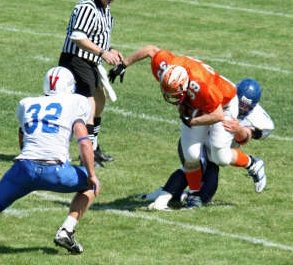
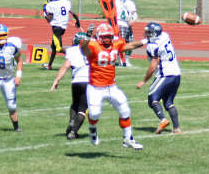
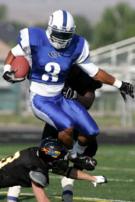
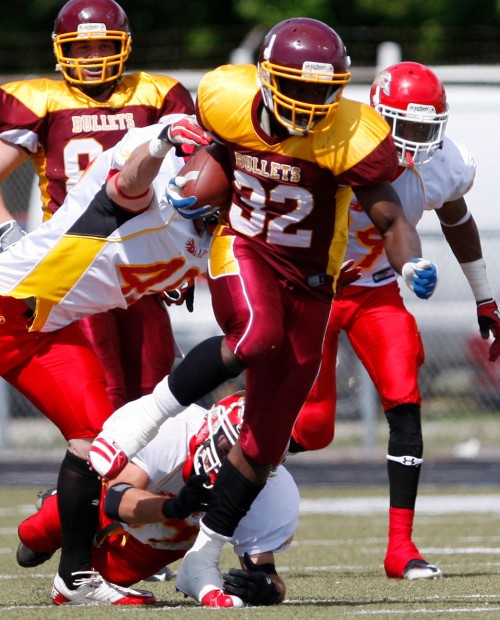
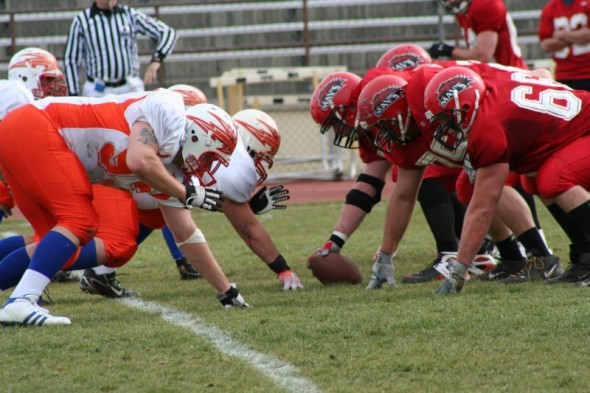
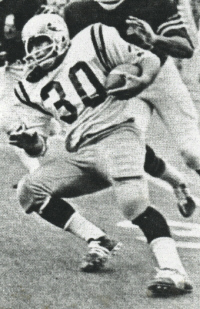 |

